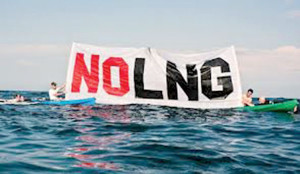By John Burton
The local community has an opportunity to weigh in on the proposed and controversial liquid natural gas port off of the New Jersey and New York coast, both Wednesday, Nov. 4 and Thursday Nov. 5 with environmental groups seeing it as one last chance to voice opposition.
The local public input session, sponsored by the U.S. Maritime Administration, will start with an open house, beginning at 4:30 p.m. each day, with the formal hearings slated from 6 to 10 p.m. at the Sheraton Hotel, Hwy. 35, Eatontown.
The Port Ambrose liquid natural gas terminal has sparked vocal opposition from environmental groups while those proposing the plan insist it will offer additional energy independence. The Maritime Administration is also holding hearings in New York on Monday, Nov. 2 and Tuesday, Nov. 3, at the Long Beach Hotel, Long Beach, Long Island.
In addition to the public hearings, the public can continue to submit written comments until the end of November.
“This is where the story is going to end,” said Cindy Zipf, executive director of Clean Ocean Action, one of the environmental organizations that have voiced staunch opposition for the plan. “Either we’re going to have an industrialized ocean off our coast or we’re not.”
Representatives for Liberty Natural Gas, LLC, which is proposing the LNG, have continued to argue the facility will be a safe and effective way of storing the fuel off of the coast.
Following the hearings, the maritime administration and the U.S. Coast Guard will evaluate the public comments and offer its recommendation and would be responsible for issuing the necessary permits. But before that, New Jersey Gov. Chris Christie and New York Gov. Andrew Cuomo will have a 45-day period to offer their take, with both having the ability to unilaterally veto the plan.
As has been the case prior to the last public input sessions in January, calls to both governors’ offices seeking comment were not returned.
But Christie back in 2011 did veto a similar proposal put forth by Liberty Natural Gas to establish a deep water natural gas terminal, Port Liberty, off of Asbury Park and had said publicly at the time he would continue to oppose such facilities off of New Jersey.
State Senator Jennifer Beck and Assemblywoman Caroline Casagrande (both R-11) have also expressed their opposition.
Liberty Natural Gas, Jersey City, is a privately held, for-profit holding company and is advised by the Toronto, Canada-based West Face Capital investment capital firm, according to information provided by Liberty Natural Gas.
The firm would like to construct the terminal which would sit about 28 miles off Long Branch and 18 miles from Long Island, New York’s shore.

gas terminal off the New Jersey coast. Photo courtesy Clean Ocean Action
The facility’s pipeline would run about 13 miles off Sandy Hook, Zipf maintained.
Opponents see this as another unnecessary commercialization of the waterways, potentially environmentally harmful and posing a national security threat.
“It’ll be very close to the most densely populated, urbanized area in America,” and could present a terrorist target, Zipf warned.
Liberty Natural Gas, however, has maintained it would allow for an affordable and readily available supply of natural gas, helping stabilize prices, especially during the winter months, when natural gas can have wide price swings.
Liberty said its position has been bolstered by the release of the maritime association and Coast Guard’s 4,000-plus page environmental impact statement, company representatives say support their assertion. Roger Whelan, Liberty’s chief executive officer said in a released statement that the report, “confirms that Port Ambrose is a safe and environmentally responsible project with minimum impact.”
Zipf countered by saying that report acknowledges the billions of gallons of Atlantic Ocean water that could be contaminated “and you read about the 46 million fish eggs and larvae they’re going to destroy.”














